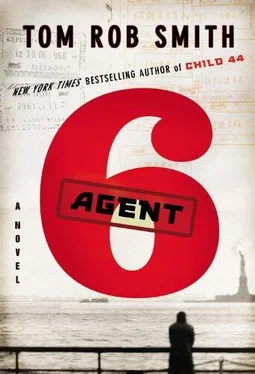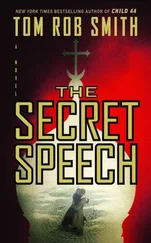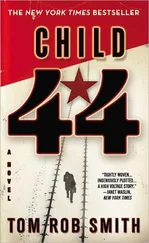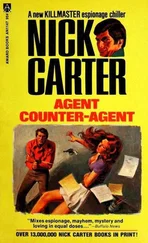Tom Smith - Agent 6
Здесь есть возможность читать онлайн «Tom Smith - Agent 6» весь текст электронной книги совершенно бесплатно (целиком полную версию без сокращений). В некоторых случаях можно слушать аудио, скачать через торрент в формате fb2 и присутствует краткое содержание. Жанр: Триллер, на английском языке. Описание произведения, (предисловие) а так же отзывы посетителей доступны на портале библиотеки ЛибКат.
- Название:Agent 6
- Автор:
- Жанр:
- Год:неизвестен
- ISBN:нет данных
- Рейтинг книги:4 / 5. Голосов: 1
-
Избранное:Добавить в избранное
- Отзывы:
-
Ваша оценка:
- 80
- 1
- 2
- 3
- 4
- 5
Agent 6: краткое содержание, описание и аннотация
Предлагаем к чтению аннотацию, описание, краткое содержание или предисловие (зависит от того, что написал сам автор книги «Agent 6»). Если вы не нашли необходимую информацию о книге — напишите в комментариях, мы постараемся отыскать её.
Agent 6 — читать онлайн бесплатно полную книгу (весь текст) целиком
Ниже представлен текст книги, разбитый по страницам. Система сохранения места последней прочитанной страницы, позволяет с удобством читать онлайн бесплатно книгу «Agent 6», без необходимости каждый раз заново искать на чём Вы остановились. Поставьте закладку, и сможете в любой момент перейти на страницу, на которой закончили чтение.
Интервал:
Закладка:
Leo retrieved his pipe: a thin wood tube with a small steel pot roughly two-thirds of the way down from the mouthpiece. There were crude carvings around the rim, a blackened interior where the opium burned. Though it had never been mentioned directly, his addiction was no secret to his superiors. A system of tacit consent allowed soldiers and officials any pleasures accessible to them, a form of compensation to supplement wages that could never be high enough to offset the dangers of Afghanistan. For Leo, opium had nothing to do with pleasure, it was a continuation of the logic he applied to his apartment, making his body foreign and quite unlike the body that had slept beside Raisa nearly every night of his life for fifteen years – an addiction, certainly, but also a strategy to cope with his grief.
He hastened to his stash, breaking off a pea-sized amount, his fingers fumbling, the opium falling to the dusty floor. On his knees, he picked it up, regarding the dust-covered lump. He blew it. The dust remained: the opium was sticky. It didn’t matter. He placed it in the cup of the steel holder and lit a candle, impatiently waiting for the flame to take. Opium did not burn easily like tobacco and required a constant source of heat. Lying on the bed, on his stomach, he positioned the steel pot over the candle, eyes on the opium, hungry for it to melt in the flame and the smoke to travel up the pipe. The opium began to burn, the shape of the lump changing. He inhaled deeply, filling his lungs, the smoke slowly dissipating the sense of restlessness, re-dissolving the frustrations and failings.
Sedating his emotions in the way that a surgeon’s team anaesthetizes a patient before operating, Leo was able to return to the memories of Raisa, examining them with opium-induced distance as if they belonged to another man from a far-away world. In Moscow he’d been surrounded by the life he’d created with her, from their apartment to the city itself, the parks, the river; even the sound of the tramcars rattling past caused him to stop mid-sentence, his chest gripped by a physical pain. The bitter winters, the hot summers – there was nothing that her memory wasn’t stamped upon. In the months immediately after her murder the desire to investigate blazed in his mind as bright as the surface of sun, consuming all other concerns. He had no other thoughts from the moment he woke to collapsing on his bed, catching only a few hours of fretful, disturbed sleep. He petitioned officials, wrote letters, begged for the chance to go to New York only to be told time and time again that what he asked was impossible.
Raisa’s body had been returned to Moscow. L had demanded a second autopsy. To his surprise this had been agreed to, perhaps in the hope that it would allow him to grieve and drop his incessant requests. The Soviet doctors confirmed the American verdict that she’d been shot from a distance of about ten metres: killed by a single bullet from a powerful handgun, a wound to her torso, entering just underneath her rib. Reading the report, he insisted that he be allowed to see her body. His wife had been laid out on a steel table covered with a thin white sheet. He’d taken hold of the sheet, pulling it back to her waist – a reunion of the most awful kind. Her skin, always pale, was now watery white with trace-lines of blue. He ignored instructions not to touch her, opened her eyes. They’d been so full of intelligence, shrewd and playful at the same time, careful and mischievous, yet there was nothing in these eyes staring at the ceiling. He was so startled by the change that he’d momentarily wondered if this could even be the same woman, as if her life and intelligence were forces too powerful to ever be fully extinguished and some residual vestige would surely remain.
He’d recovered his composure, begun a dispassionate examination as a police officer. He’d taken out a small notebook. He’d picked up a pen. When he looked down at first page of the notebook he saw a scribbled line, involuntarily formed as his hand had trembled across the page. He’d steadied himself, ripping the front page off and noting down several observations, checking them with the doctor beside him. She’d died from loss of blood. A former soldier, he knew vividly from the sight of the wound that such a death would not have been instantaneous but painful and slow. He asked the doctor for an estimate of the time it would have taken from the bullet entering her body to her death. She’d been in Manhattan when the shooting occurred, only minutes from some of the best hospitals in the world. The doctor had been unable to fix a time, saying it varied enormously from person to person and there was no formula. Pressed by Leo, he guessed between twenty and thirty minutes – which surely meant the official version of events was a fiction. Raisa could have been saved. With this fact, his desire hardened – he had to reach New York with or without the State’s permission.
Blind as he was to other matters, it was Zoya who forced him to confront the repercussions of his obsessive investigative efforts. In the months after their return Elena’s academic work had suffered greatly, she’d lost weight – she’d become reclusive, fearful of making friends and suspicious of friends she’d known for years. She felt it her duty not to leave Leo alone in his tormented state and yet his anguish was painful to witness. Zoya pointed out that this way of living was not living at all. They had to move on as a family. Her determination and intelligence reminded him of Raisa. Though he did not abandon his investigation, he realized that the chances of an imminent breakthrough were slim and he agreed to refocus his energies, pushing the matter of New York into the background, keeping his preoccupation invisible. In this manner of compromise they lived together for seven years. During these years there were many times when Leo was happy, only for that happiness to melt away suddenly when his thoughts returned to Raisa, as they always did. He learned to mask his emotions from his daughters better. He learned to lie, to pretend. Elena recovered. She finished her studies. Zoya became a doctor. They both found love. Elena married first, at twenty-one, throwing herself into a romance, love once again the answer. Zoya waited a little longer before marrying. With both daughters living in their own apartments, Leo considered his promise fulfilled. He was alone and his mind returned to the task he’d never abandoned.
For years he’d considered the case and yet it baffled him. He did not know what lay beneath the plan to murder Jesse Austin. He’d decided that his first objective must be to track down the propaganda officer Mikael Ivanov, the man who’d tricked his daughter. His search stemmed not out of a desire for revenge but because Ivanov would have important information regarding the events of that night. It was logical to find him before attempting to reach New York.
Ivanov was no longer living in Moscow and it took a great deal of effort and bribery to find out that he’d been relocated to the city of Perm, in the central region of Russia. Arriving in Perm, travelling without authorization, Leo discovered that Ivanov had been sent there after returning from New York, working in local government, with a fondness for drink. Several winters ago he’d become drunk and walked out into the centre of a lake, falling through the ice and dying of pneumonia. Some believed it was an accident: others believed it was suicide. Leo had visited the cemetery. The seven-year delay had made it far harder to unearth the truth. Evidence, memories and witnesses faded like the ink in the newspaper articles he’d collected.
No more time could be wasted. He began to devise a way to reach New York, saving up his modest salary to buy gold on the black market, necessary once he crossed the border, carefully plotting a route to the United States. These preparations offered the glimmer of a resolution – no matter how difficult it might be to achieve.
Читать дальшеИнтервал:
Закладка:
Похожие книги на «Agent 6»
Представляем Вашему вниманию похожие книги на «Agent 6» списком для выбора. Мы отобрали схожую по названию и смыслу литературу в надежде предоставить читателям больше вариантов отыскать новые, интересные, ещё непрочитанные произведения.
Обсуждение, отзывы о книге «Agent 6» и просто собственные мнения читателей. Оставьте ваши комментарии, напишите, что Вы думаете о произведении, его смысле или главных героях. Укажите что конкретно понравилось, а что нет, и почему Вы так считаете.












